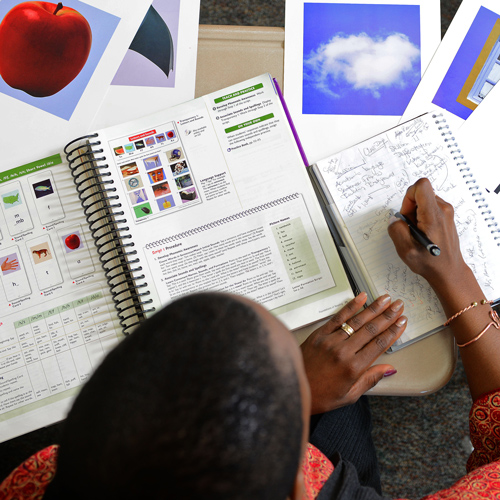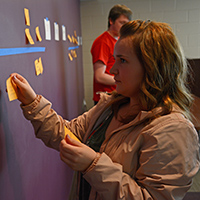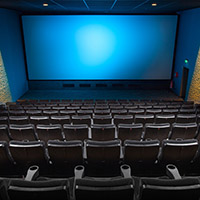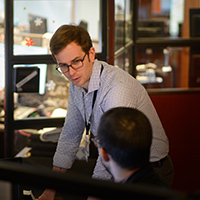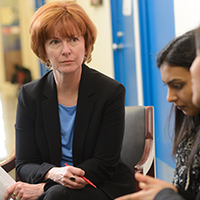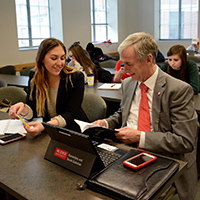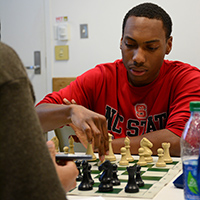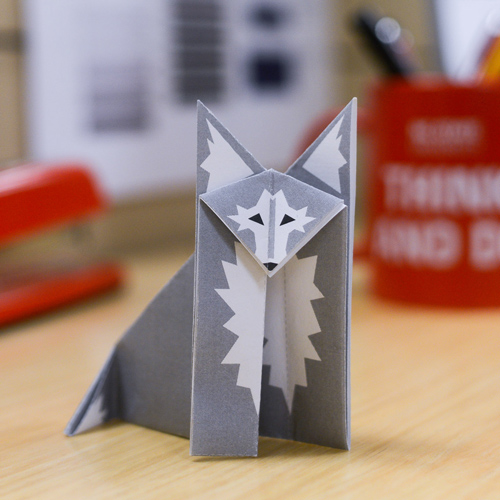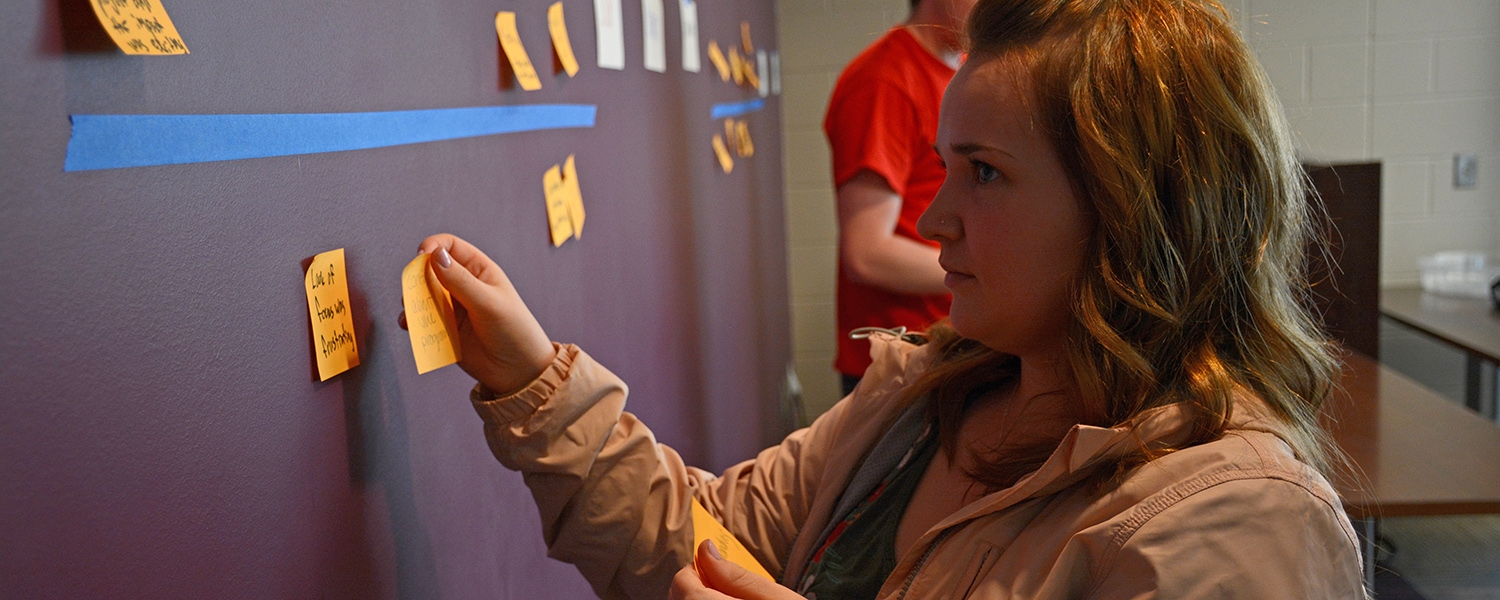
Students forSocial Change
Teamed up with a statistician and three engineers, Shawn Fredericks wears his humanities badge with pride.
A junior at NC State majoring in international studies, Fredericks has been working with his peers from STEM for the past year to develop solutions for the nonprofit Wine to Water. The organization, which provides clean water solutions to communities around the world, has tasked Fredericks’ group to clarify instructions on how to use a Wine to Water filter.
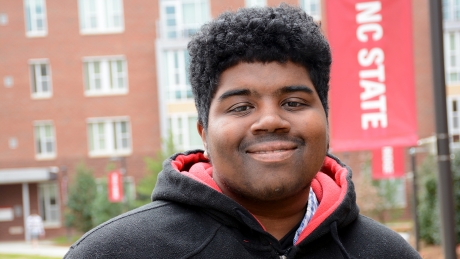
“What we’ve noticed is that language may be a barrier for people in understanding how to use the filter,” Fredericks says. “We want to make sure anybody can use it.”
Their project is part of a new NC State initiative called the Social Innovation Fellows. The program partners students with nonprofits and businesses that aim to solve social challenges in communities. Fredericks is one of 30 fellows in this year’s cohort, who are all tackling issues related to food and water insecurity.
Fredericks’ team is exploring how iconography could provide more visual and universal documentation for Wine to Water’s users. The team is also considering how add-ons could serve as additional instruction — such as a small dock to hold a syringe that’s used to clean water filters.
After establishing a filter system, Wine to Water seeks to empower community members to properly use and maintain the filter themselves over time. “So that’s why it’s important for us to make sure these instructions are clear, so there’s a clear reference point for people to go back to, even after the Wine to Water team is gone,” Fredericks says.
It’s very real. We’re doing something to solve a problem.
“What really excites me about being the humanities major on my team is being able to translate some of these concepts and make them broad enough for people to understand,” Fredericks says. “I also take pride in the fact that I’m working with a whole bunch of engineers and learning about things such as prototyping.”
Prior to joining the Social Innovation Fellows, Fredericks says he wasn’t familiar with the concept of social entrepreneurship. However, through his work with Wine to Water, he’s observed, learned from and participated in an effective model for creating change. And the best part: he’s part of the solution.
“It’s very real. We’re doing something to solve a problem,” Fredericks says. “We’re trying to accomplish a goal, and it’s all hands on deck.”
A New Lens for a Vibrant Campus
At NC State, the campus is alive with entrepreneurial thinking. You can see it on display at annual events such as the Lulu eGames and Entrepalooza, where dozens of student entrepreneurs compete against one another in pitch contests.
With such a vibrant atmosphere, Elizabeth Benefield says it’s vital for students to consider the social impact of their work. Benefield, the social entrepreneurship program manager at NC State’s Institute for Nonprofits, created the Social Innovation Fellows program to help equip students with a broader lens to view their work.
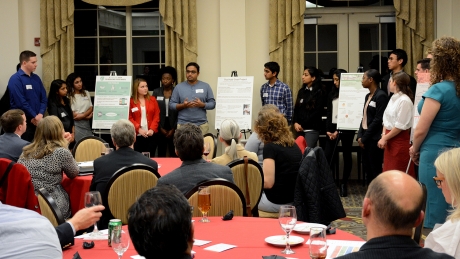
“Often you’ll talk to teams working on a venture to meet a class requirement or compete in the eGames, and they’ve developed a pretty strong love for their solution,” Benefield says. “I always say, ‘fall in love with the problem.’ Most students haven’t had experience understanding the problem from diverse perspectives and disciplines.”
More than 85 students applied to serve as a fellow this inaugural year. The program accepted 30 students, who represent nine of NC State’s academic colleges and include both undergraduate and graduate students.
Fellows separated into six interdisciplinary teams, each of which is working on a solution for a nonprofit or social venture. Organized under the theme of food and water insecurity, this year’s teams and participating organizations are:
- Food Waste and Food Insecurity, which aims to raise awareness about food insecurity on college campuses.
- Freshspire, which reroutes fresh food away from landfills.
- Haiti Goat Project, which supports the development of sustainable animal agriculture in Haiti.
- Oceanworks, which combats oceanic plastic waste through unique recycling projects.
- Rise Against Hunger, an international hunger relief organization that distributes food and aid to vulnerable communities around the world.
- Wine to Water, which provides clean water solutions to communities around the world.
The teams move through a “Discover, Design and Do Good” curriculum, first fully researching their problem before considering a solution design. The process is dynamic and utilizes human-centered design thinking and appreciative inquiry skills.
The final phase tasks the teams to create a viable solution using skills gained in business modeling, marketing, technical writing and building stakeholders. Each team receives a micro-investment of $1,000 to help with the work and a community mentor to guide and energize their progress.
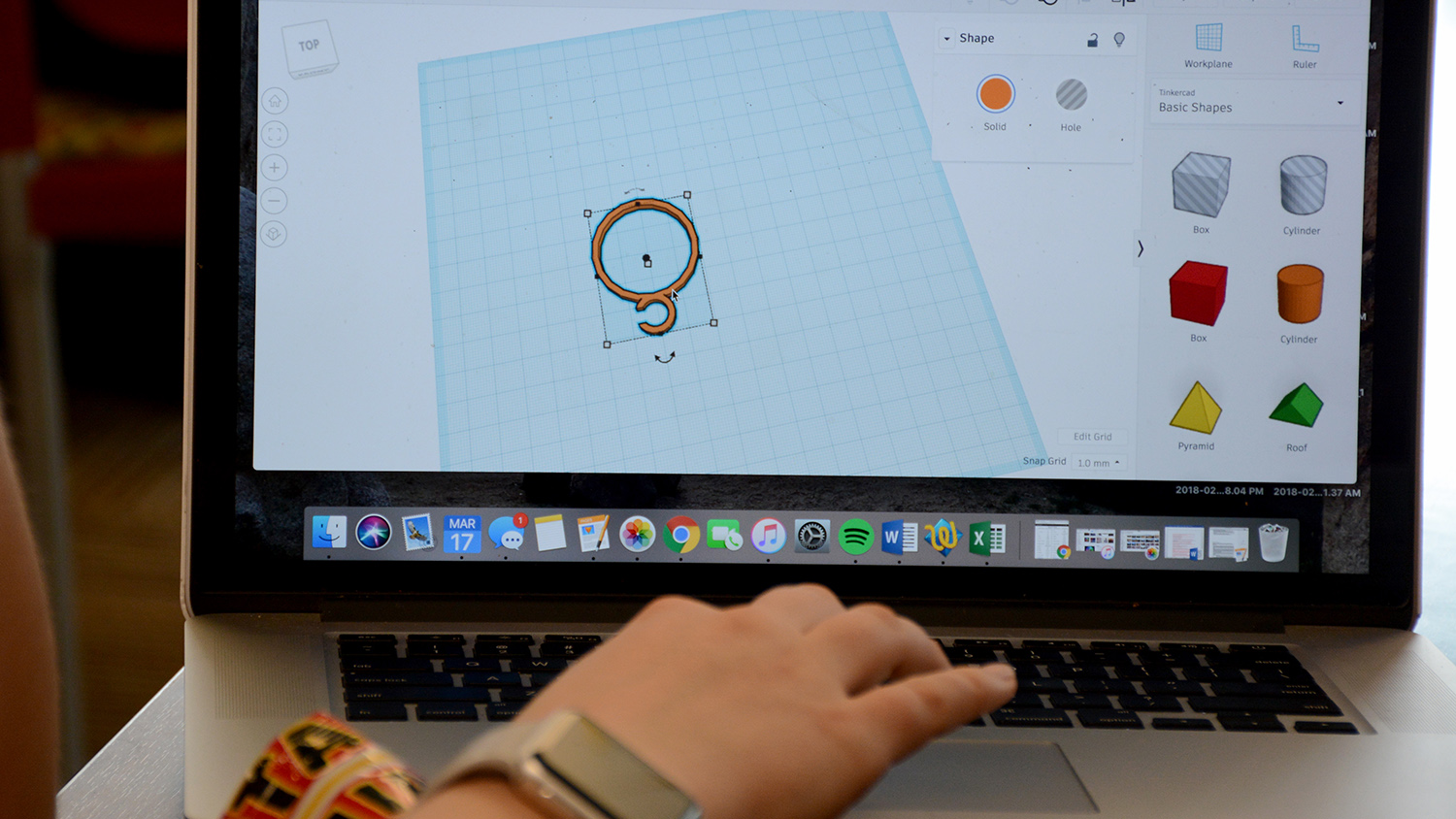
The Wine to Water team designed a dock to hold a syringe, which is used to clean the water filters the nonprofit provides.

The students used a 3-D printer to create a prototype of the syringe dock, which could eventually help communities properly maintain and use the filter.
In addition to their work as teams, all the fellows gather once a month for “Innovation Labs.” The skill-based workshops focus on topics such as team-building skills, creative problem solving, adaptive leadership and good business practices.
Fellows also work with members of the Social Innovation Fellows Brain Trust, a group of local entrepreneurs, community leaders and subject-matter experts who serve as mentors to the teams. Cross-campus support is also evident. The Kenan Institute for Engineering and Technology, for one, provided early funding support as well as hands-on mentoring for the student teams.
Brain Trust member Melissa Beard, for instance, has been working with the Wine to Water team. Beard, who has more than 20 years experience in nonprofit management, currently works as an affiliate consultant for ReedScott. Thus far, she’s served as matchmaker for the group, connecting team members with other professionals who have done similar work.
“The Social Innovation Fellows program is unique in that it is interdisciplinary and global in focus,” Beard says. “Students are being challenged to address issues that they haven’t experienced and are being pushed to learn about the limitations of working in a developing country.
“This type of experience is so important because our world is more open than ever before. Most college students today will work with people from other cultures and countries and will travel more than previous generations. It’s crucial that these types of programs foster a sense of ‘global citizenship’ and a respect for people who face different challenges around the world.”
The Value of Multiple Perspectives
Rachel Poythress wanted to make a difference in the world, but didn’t know where to begin. The Social Innovation Fellows program provided a starting point.
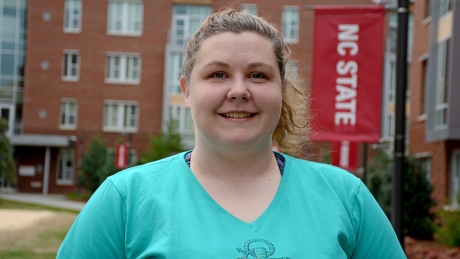
Poythress, a senior majoring in anthropology, is working with the local startup Freshspire. The organization aims to divert fresh food from landfills by facilitating a network of food distributors, restaurants and other consumers. Poythress’ team is developing communicative and logistical strategies that would position Freshspire to serve as a food waste consultant.
“For example, we’re setting up an email subscription that would make it easy for restaurants to find and purchase discounted foods from distributors — food that would otherwise go bad,” Poythress says. In addition to being a tool for businesses, the paid subscription would also provide a source of revenue for Freshspire.
Poythress’ team includes Freshspire cofounder Shraddha Rathod, an NC State senior studying electrical and computer engineering. Other team members have backgrounds in business administration, and sustainable materials and technology.
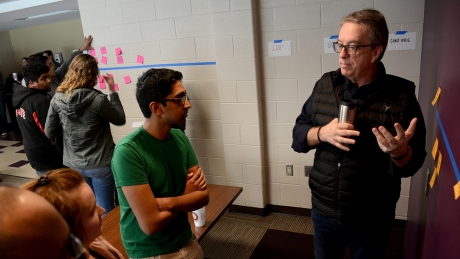
“We all obviously are passionate about social change,” she says. “But we all have different backgrounds, we all have different points of view and different things to contribute — it’s been really awesome to see.”
After graduating from NC State, Poythress plans to earn a master’s degree in peace and nonviolent resolution studies. She wants a career where she can work with social justice issues, something she has previous experience with as a volunteer with groups such as the Southern Poverty Law Center and Grassroots Campaigns. Her passion goes hand in hand with her studies in cultural anthropology and the overall concept of the Social Innovation Fellows.
“Through my lens as an anthropologist, I really like how it forces you to approach issues from the perspective of the culture you’re working with,” Poythress says. “We have to understand the context of the community we’re working with and consider how they see the problem — or if they even see a problem in the first place.”
Support Social Entrepreneurship
Support programs such as the Social Innovation Fellows by making a gift to NC State’s Social Entrepreneurship Program.
Poythress says she’s enjoyed learning from the specific expertise of her teammates and how to blend so many diverse perspectives.
“There are so many times when we try to solve a problem, but don’t think about certain consequences or certain populations — and we end up actually messing something up,” Poythress says. “It’s been really cool to approach one issue from so many different perspectives and understand all the different aspects of it.”
CATEGORIES: Anthropology, Interdisciplinary Studies, Spring 2018, Students
